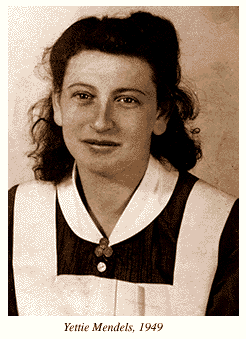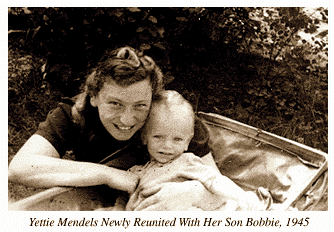YETTIE MENDELS TELLS HER STORY
Henny Juliard, Ans Mendels, and their four brothers and sisters were children of their father's first marriage. After their mother died, their father remarried and had two more children, Yettie and John. The second marriage is remembered with great fondness by Henny and Yettie, who enjoyed growing up with all of their siblings in an atmosphere of loving affection.
In 1942, as the Nazi noose tightened around the Dutch Jewish community, Yettie fell in love and married Bob Wolf. Before the German occupation he was a specialist in aeronautic electronics. When the Nazis forced professional Dutch Jews out of their positions, he took a job as an electrician in a Jewish old-age home in The Hague. He and Yettie lived there in a small room.
During this period and unknown to Yettie, her older sisters Henny and Ans had gone underground, hiding in the home of Bert and Annie Bochove in the town of Huizen.
 YETTIE MENDELS: From the moment I came to Huizen in January '44 until the end of the war, everything that happened to me went through Bert Bochove. He always knew; he always helped; he did all the arranging. I'm sure he forgot all about it because I was such a small part of all the work that he did, but I remember quite well; the things he did were very, very important for me.
YETTIE MENDELS: From the moment I came to Huizen in January '44 until the end of the war, everything that happened to me went through Bert Bochove. He always knew; he always helped; he did all the arranging. I'm sure he forgot all about it because I was such a small part of all the work that he did, but I remember quite well; the things he did were very, very important for me.
I was in Bochove's house for only one night because his house was already completely filled with Jewish people. The next day he arranged for me to go to another family. But first there's the story of how I came to Bochove's; it's not a nice story.
A few months before I was married I received a letter from the German authorities telling me to report to the train station; it gave all the details including what I should bring. I went to see Ans, to talk it over.
"I'm not going," I told her.
"No, of course you are not going."
I simply left Rotterdam and pretended I never got the letter. The odd thing is I don't remember where I went or where I stayed before my wedding. There are plenty of things I don't remember about those times, because I pushed everything away. I suppose it was necessary for my survival.
My parents lived in the north of Holland. They came to our wedding in September '42. That was the last time I saw them. In October they were caught in one of the first big roundups of Jews, and taken to
Westerbork
concentration camp. We only learned about it when Henny got Father's letter from Westerbork. He wrote that he knew this was the end. He must have really believed that because he also wrote that he now accepted my brother marrying his non-Jewish girlfriend, which, being a religious man, he had been very much against. This was the first such marriage in our family, and it was very hard for him.
Then we found out that my eldest sister and brother, together with their children and families, were also caught and sent to Westerbork. My brother Max corresponded with us from Westerbork for a very long time, but finally he was taken with the rest, in one of the very last transports to Poland. None of them came back.
 By the end of the year the Germans ordered the entire Jewish old-age home where we were living to pack up and move from The Hague to the Amsterdam ghetto--all of us together. I don't think we recognized the danger. I didn't; I thought we'd come through. At the time, what else could you think?
By the end of the year the Germans ordered the entire Jewish old-age home where we were living to pack up and move from The Hague to the Amsterdam ghetto--all of us together. I don't think we recognized the danger. I didn't; I thought we'd come through. At the time, what else could you think?
Living in the Amsterdam ghetto was terrible. I didn't know a single person. No one talked to me--it was too dangerous. By then, no one in the ghetto was actually from Amsterdam; those people were all gone. We lived in the house of Jewish people who had been taken away--it was their furniture, their kitchen, their plates, their everything. It was horrible.
Before very long, the elderly people from our old-age home were taken away to Westerbork, but we were allowed to stay on because Bob, being an electrician, had special papers. The
Joodsche Rad
, (Jewish Council) who ran things in the ghetto, gave special identity papers to people who were useful, to protect them from being sent to Westerbork. But you never knew: sometimes the next day the Germans would say, no, that paper is worthless, and they would pick you up. You could never feel safe, not even for one hour.
In May '43, Corrie Zondervan, my brother's non-Jewish fiance, came to see us from The Hague. I was pregnant.
"It's not good for you to be here any longer. They will empty out the ghetto very soon and you will end up like the others. I'm going to take you out, but it's better if you don't go together. I'll take Yettie today and come back tomorrow for Bob."
I went with her that same afternoon. But before she could return the next day there was a big raid--no one had expected it--and my husband was picked up, right in the street. For two or three months Bob wrote to me from Westerbork, then he was sent to
Sobibor
, in Poland, where his life ended. But I didn't learn about that until much later.
Corrie took me to her home in The Hague where she was living with her parents and sisters; my youngest brother John was there too. A few months later the Gestapo came to their house looking for my brother. As they were coming in the front door, he ran out the back way, and all they found was me, with no papers--just a very big belly. I was so big, I couldn't run. So instead I put on a grand performance for them, pretending I was in labor. I had no idea I was capable of such a thing, but it scared them. They left me alone.
That same evening Corrie found somebody in the underground who brought me to a hospital. Giving me her own identity papers, she registered me as an unwed mother. Five days later my son Bobbie was born. I stayed in the hospital a few more weeks until the underground could arrange for new papers--which was not so easy--and find a home for me and the child. We stayed with a family of Communists for the next three months, until one day one of their sons was arrested and shot by the Germans, for working in the underground. Then it was too dangerous to stay there any longer.
Finding another family where Bobbie and I could be together was very, very hard, in fact, impossible. The underground people took away my three and a half-month old baby and sent him to the north of Holland. I didn't see him again until he was two and a half years old. In the meantime I waltzed from one place to another, here one night, there one night--fourteen places altogether--and all that time I never knew where my child was.

It was a funny life. I was young then, only twenty-three, and without much experience. I was alone. I lived day by day, very superficially; I didn't think too much--the time was like that. I didn't know what had happened to my parents, to my brothers and sisters, to my husband. You can't imagine what it's like--utterly impossible.
At last I came to a place where a friend of one of my sisters lived. She was too afraid to keep me for even a couple of days, but she knew where Ans and Henny were; I hadn't seen them since before I left the Amsterdam ghetto. She gave me the Bochove's address.
When I arrived at the Bochove's house it was full. I stayed only one night, but Bert found a very good place for me in Huizen, with a woman whose husband and son were in a concentration camp because they had helped Jews.
One day while I was living with this woman, the Germans encircled Huizen and began a razzia---a raid to find Jews in hiding. They visited every house in Huizen that day. I knew that my sisters and brother-in-law and other Jewish families were at Bert's, but I also knew that he had a good hiding place for them that was nearly impossible to find. The house where I was staying was on the edge of town, so the Germans were in our garden almost immediately. I was upstairs when they came inside. The lady called up to me, "Yettie, come down here. They're taking something that belongs to my husband." She couldn't speak German and wanted me to help. When I went down I saw that one of the men had opened a drawer and taken out a pair of binoculars.
I shouted at him, "You can't take that! It's forbidden! I'll report you to your officer!" He put the binoculars down and left. I wasn't at all afraid. I felt very secure. I don't know why, but I didn't believe that anything more could happen to me after that horrible night when I was nine months pregnant and the Germans tried to take me away. From that moment I had lost my fear. Later I would become afraid again, but at that point I had no fear.
They did pick up some people, but most of the Jews in Huizen came through that day. At Bert Bochove's they didn't find anyone.
 By the end of the year the Germans ordered the entire Jewish old-age home where we were living to pack up and move from The Hague to the Amsterdam ghetto--all of us together. I don't think we recognized the danger. I didn't; I thought we'd come through. At the time, what else could you think?
By the end of the year the Germans ordered the entire Jewish old-age home where we were living to pack up and move from The Hague to the Amsterdam ghetto--all of us together. I don't think we recognized the danger. I didn't; I thought we'd come through. At the time, what else could you think?
 YETTIE MENDELS: From the moment I came to Huizen in January '44 until the end of the war, everything that happened to me went through Bert Bochove. He always knew; he always helped; he did all the arranging. I'm sure he forgot all about it because I was such a small part of all the work that he did, but I remember quite well; the things he did were very, very important for me.
YETTIE MENDELS: From the moment I came to Huizen in January '44 until the end of the war, everything that happened to me went through Bert Bochove. He always knew; he always helped; he did all the arranging. I'm sure he forgot all about it because I was such a small part of all the work that he did, but I remember quite well; the things he did were very, very important for me.
